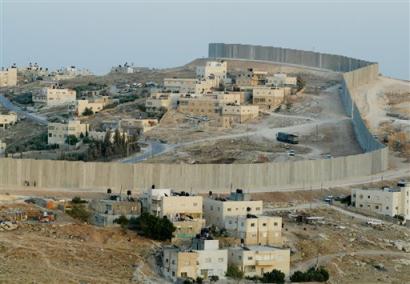One of the most useful intercultural tools that I’ve come across is Milton Bennett’s “Developmental Model of Intercultural Sensitivity” (DMIS), which considers the process of growth that people experience as they encounter cultural difference.*

 And seen in this light, the actions of the Israeli government since the two intifadas, attempting by all possible means to separate the Palestinian from the Jewish people, with the ultimate step of building a “separation barrier” (or, as Palestinians refer to it, an “apartheid wall”), represent steps away from, not toward, peace. A generation of Palestinian young people is growing up now, whose only contact with Israeli Jews is with soldiers (at checkpoints and in other situations). And the same on the Israeli side (Israelis are prohibited by Israeli law from entering Palestinian controlled “zone A” areas).
And seen in this light, the actions of the Israeli government since the two intifadas, attempting by all possible means to separate the Palestinian from the Jewish people, with the ultimate step of building a “separation barrier” (or, as Palestinians refer to it, an “apartheid wall”), represent steps away from, not toward, peace. A generation of Palestinian young people is growing up now, whose only contact with Israeli Jews is with soldiers (at checkpoints and in other situations). And the same on the Israeli side (Israelis are prohibited by Israeli law from entering Palestinian controlled “zone A” areas).
In Bennett’s model, people grow from an experience centered in ethnocentrism – seeing and experiencing the world only from the perspective of one’s own people and cultural context – to an experience that he calls “ethnorelativism,” which involves developing the ability to know one’s own culture and worldview as one among many, and the ability to enter into the world of others, adapt, and live effectively in that other cultural context.

As I consider conflict and the challenge of pursuing peace, I find myself reflecting on insights from the DMIS to the process of seeking peace (whether in the Palestinian-Israeli conflict, Muslim-Christian relations, or any realm).
How Denial hinders peace
The first phase in the DMIS is denial (ignorance, lack of awareness). We begin by not being aware of (cultural) difference, and avoiding it. The world simply is as we see and experience it. We are “the people” (and any others are beyond our clear vision or understanding). If we are aware of others, they are broadly characterized, e.g., we lump all “Asians” or “Africans” or “Europeans” together, with no real knowledge of any specific characteristics.
Denial may be accompanied by isolation, simply being out of contact with different others, or by separation, “intentional erection of physical or social barriers to create distance from cultural difference as a means of maintaining a state of denial” (e.g., racial neighborhoods or ghettos). Denial is often accompanied by extreme nationalism. The “dangerous underside” of denial, Bennett points out, is the implicit relegation of others to subhuman status (e.g., the Nazi treatment of the Jews).
Most of the peace activists I have read, point out that peace is more than the absence of conflict. True peace between peoples involves building something positive, building relationship, developing understanding and coexistence and harmony between peoples. For peace, we need more than different peoples simply staying away from and ignoring each other, and seeking to avoid entering into conflict. We need more than walls keeping us apart.
Thus, this stage of denial hinders peace, because when we live in isolation in our own world, thinking that we are the only real people, and that the world is just as we see it to be, we are not living in relationship or harmony with others. If we want peace, we cannot be content with denial of difference (either isolation or separation).
 And seen in this light, the actions of the Israeli government since the two intifadas, attempting by all possible means to separate the Palestinian from the Jewish people, with the ultimate step of building a “separation barrier” (or, as Palestinians refer to it, an “apartheid wall”), represent steps away from, not toward, peace. A generation of Palestinian young people is growing up now, whose only contact with Israeli Jews is with soldiers (at checkpoints and in other situations). And the same on the Israeli side (Israelis are prohibited by Israeli law from entering Palestinian controlled “zone A” areas).
And seen in this light, the actions of the Israeli government since the two intifadas, attempting by all possible means to separate the Palestinian from the Jewish people, with the ultimate step of building a “separation barrier” (or, as Palestinians refer to it, an “apartheid wall”), represent steps away from, not toward, peace. A generation of Palestinian young people is growing up now, whose only contact with Israeli Jews is with soldiers (at checkpoints and in other situations). And the same on the Israeli side (Israelis are prohibited by Israeli law from entering Palestinian controlled “zone A” areas). We cannot stay apart, and find peace. We cannot live as if others do not exist, and find peace. We cannot feed ourselves the myth that we are right, that God is on our side, that we are “the people” and that all others are just vaguely “out there” in the darkness beyond the borders of our world, and find peace.
If we want peace, we must move beyond the ethnocentric stage of denial.
(Coming next: how defense hinders peace)
*For full treatment of Bennett’s model, see
Bennett, Milton J., “Towards Ethnorelativism: A Developmental Model of Intercultural Sensitivity.” In Paige, R.M. (Ed). (1993) Education for the Intercultural Experience (2nd ed., p. 21-71). Yarmouth , ME
Bennett, Milton J., “Becoming Interculturally Competent.” In Wurzel, Jaime S., ed., Toward multiculturalism: A reader in multicultural education (2nd ed., pp. 62-77). Newton , MA
No comments:
Post a Comment